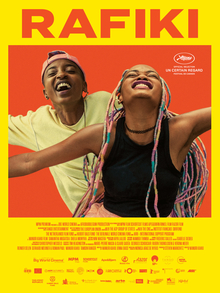Wanuri Kahiu is a Kenyan director of some renown and I believe this is the film of hers that has made the most impact internationally so far. It’s a romance about a couple of young lesbians and given the state of LBGT rights in Kenya, it’s no surprise that this was banned in its home country. The ban however was lifted after the director took the matter to court. It feels a little rough around the edges to me in terms of production quality but it is heartfelt and the Kenyan setting makes it doubly interesting.
Kena’s father John runs a small convenience store in the neighborhood and he is also running as a candidate in the local election. Kena helps out at the store while waiting for her exam results but lives with her mother who is separated from her father. Meanwhile another girl Ziki with brightly colored hair hangs out nearby with her friends. She is the daughter of the incumbent that John is running against but Kena is attracted to her all the same. They start to spend more time together, at first as friends and then more intimately. Kena is keenly aware however that society in Kenya does not look kindly upon homosexuality and their pastor rails against LGBT rights in church. Furthermore their fathers are political rivals and both girls are still minors who are completely dependent on their families, making their dreams of staying together unrealistic.
This is a very simple story of two young girls who are experimenting with romance for the first time and learning that they are gay. It’s probably too simple for my tastes as their youth and inexperience really limits the depth to which the film can explore the topic. The photography is nothing special and some of the acting is a little amateurish. In particular Samantha Mugatsia who plays Kena is visibly a less experienced actress than Sheila Munyiva who plays Ziki. The director uses this to convey how Kena is hesitant and unsure in approaching the relationship but we can still tell that she is not that good an actress. I also dislike how Ziki is so careless about the need to conceal their relationship. I suppose that fits in with how she is from a family that is richer than Kena’s and so acts more entitled but it does reinforce the impression that this is a kind of childish infatuation. The fallout of the public discovery of their relationship is violent and horrific but it feels unsatisfying to me that the girls never get a chance to stand up for themselves. Maybe that’s just the best that can be realistically expected in Kenya.
There are some subtleties in the story which elevate my opinion of Kahiu who also contributed in writing the script. For example, Kena’s male friend Blacksta harshly mocks other men who are suspected of being gay, but when Kena herself is outed, he is sympathetic and helpful. Then there are the contracting attitudes of Kena’s parents. I read that as a reminder that different people’s views of homosexuality don’t always map neatly to their other values and opinions. As always I also appreciated this view of Kenya in general and I note that even the apartment that Ziki’s family lives in that I think is supposed to represent an upper-class family looks rather run-down even by Malaysian standards. It’s also to cool to see them eating what we call chapati over here.
Overall while this is a decently good film it’s too simple to be truly great and it could also be better in terms of production quality. In terms of characterization, it bothers me that we only see scenes of Kena having fun or socializing. Without scenes of her studying or working, it makes her relationship with Ziki feel even more juvenile, like a passing phase, instead of something that has a long-term future. I wish we also had a little more character development for Ziki as we don’t really know her at all even at the end. This is the kind of film that is good by local standards but cannot be a contender on the world stage.
